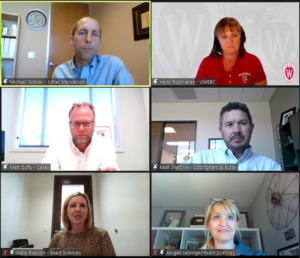Hannah Van Pay | Marketing and Communications Student Assistant
A term coined “The Great Exhaustion” by the McKinsey Report tells us just how burnt out employees are and depicts the high anxiety they are experiencing as we round a monumental corner in the COVID-19 Pandemic. In the June 15th Information Technology Peer Group Web Meeting, we discussed how to combat this exhaustion and the future of remote work through covering strategies to navigate this unique transitional moment.
Focusing in on IT and the changes the profession is going through, we heard the perspective and professional tips from Matt Duffy (Vice President of Partner Success at Carex Consulting Group), Katie Everson (Director of Talent Acquisition at Exact Sciences), Abigail Letsinger (Manager of Talent Acquisition at Exact Sciences), Mike Gotzler (Labor & Employment Attorney & Shareholder- Littler Mendelson P.C.), and Matt Shefchik (Director or Total Rewards at Cottingham & Butler) emphasizing the importance of a revised playbook to navigate this new, remote world of IT.
Group), Katie Everson (Director of Talent Acquisition at Exact Sciences), Abigail Letsinger (Manager of Talent Acquisition at Exact Sciences), Mike Gotzler (Labor & Employment Attorney & Shareholder- Littler Mendelson P.C.), and Matt Shefchik (Director or Total Rewards at Cottingham & Butler) emphasizing the importance of a revised playbook to navigate this new, remote world of IT.
The pandemic affected all of us and the way we work, but also opened many doors to people in the direction of remote work, especially when it came to the idea of remote hiring. Duffy stated: “My gut reaction is that remote hiring is here to stay, because tech talent has proven itself to be very well-suited for remote work.” Not only that, but people can now also apply and get jobs much further from their home, giving people an array of opportunities they have never had before.
All the speakers shared a common thought: virtual work is here to stay, especially in the realm of IT. Not only that, but the type of workers being hired are diversifying as well. Apart from the classic “employee,” we are now seeing an influx of independent contractors, consultants, third-party workers, gig workers, and more, all being hired in the IT field.
This evolving idea of the typical worker means new retention and engagement strategies, along with new ethical and legal considerations. Shefchik explains: “Retaining talent is super important and the number one driver of employee turnover relates to the employee’s relationship with their manager.” Since cultivating that relationship is a lot harder with remote work, it is extremely important to offer various opportunities for employee engagement. Everson and Letsinger explained some of Exact Sciences’ engagement strategies: thoughtful 1:1’s, team introductions, game nights, and even virtual happy hours were on their list of ideas.
As we emerge from the pandemic, this is the perfect time to reflect and listen, and truly think about what the future of IT talent, culture, and work in general means to us.